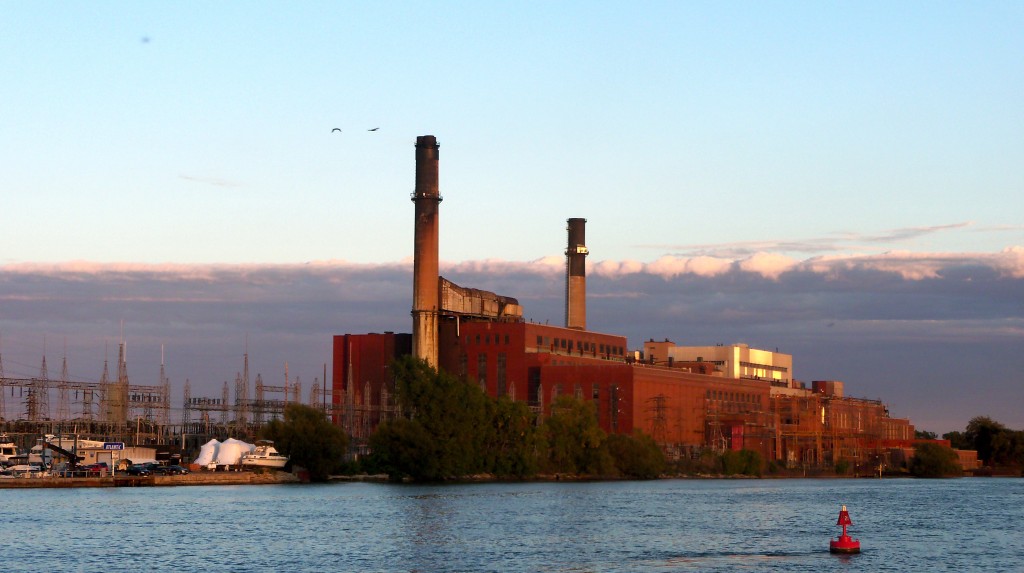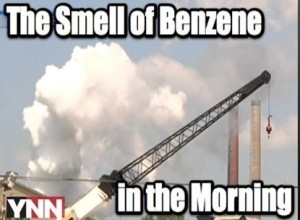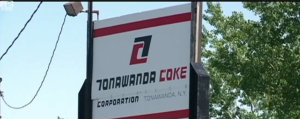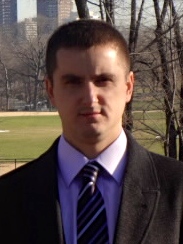Air pollution in Tonawanda (N.Y.) sickens and kills, according to pending civil suits

By Mykola Rudchyk
People living in Tonawanda, New York, outside Buffalo, have been suffering from illegally-released toxic gases in the air for years. There are 52 factories and plants in a five-mile radius around the town. The area has been under monitoring for air quality by Environmental Protection Agency (EPA). The biggest factory is the Tonawanda Coke facility, which supplies raw materials for steel production, located on a 188-acre site near the Niagara River.
 Tonawanda communities have lived for decades covered with the acrid and black smoke from the Tonawanda Coke Corporation plant. However, the coke dust that settles on houses and cars wasn’t the main concern of the families that spent their lives in the neighborhood– their biggest concern was the environmental pollutants suspended in the air and the relationship between those pollutants and community members who had been diagnosed with deadly illnesses.
Tonawanda communities have lived for decades covered with the acrid and black smoke from the Tonawanda Coke Corporation plant. However, the coke dust that settles on houses and cars wasn’t the main concern of the families that spent their lives in the neighborhood– their biggest concern was the environmental pollutants suspended in the air and the relationship between those pollutants and community members who had been diagnosed with deadly illnesses.
Most of the residents in the region were impacted differently by the black soot, and many of them complained about ongoing health issues, some of which doctors have been unable to diagnose. According to the New York Department of Health, Tonawanda’s men suffer from esophageal cancer while women suffer from uterine cancer at a rate much higher than the rest of the state. Moreover, people of the Tonawanda community have been more likely to suffer from bladder cancer, leukemia, and respiratory diseases. In particular, benzene, involved in the production of coke, has been linked to leukemia.
One Tonawanda homeowner explained that he was dealing with his own diagnosis of Chronic Obstructive Pulmonary Disease (COPD) and had the added burden of caring for his child who is still trying to come back to a normal life from a sixth operation to remove tumors from his head. Others residents stated that nearly all the houses on each street of the community had inhabitants who had died or were suffering from current diseases. Tonawanda Coke Corporation put their lives in danger– and yet they still in business.
The U.S. Environmental Protection Agency (EPA) recently funded air quality studies in the Tonawanda area. One of the studies from October 2009 determined the ambient concentration for air toxins and criteria released at four locations in Tonawanda. It indicated that in all four monitoring sites, the ambient concentrations of acetaldehyde, acrolein, benzene, carbon tetrachloride, and formaldehyde were above their legal norms. In addition, reading the Tonawanda Community Air Quality Study shows that Tonawanda Coke Corp. has been in the hot seat for environmental violations many times. Since 2005, local residents, who later became the plaintiffs in on-going civil cases, have complained about the toxic gases from the company’s plant. They even formed the Clean Air Coalition, to investigate and advocate for themselves. After complaining to state and federal agencies, a raid by federal case agents in 2009 found 75 times higher black soot exposure to the air than law permitted.
 In 2013, after a federal trial, Tonawanda Coke Corp. was found guilty of violating the Clean Air Act and its environmental manager, Mark L. Kamholz, was found guilty of concealing plant insufficiency from EPA inspectors. He stored and disposed of hazardous waste illegally when sludge from a mixing pool leached benzene into the ground. Furthermore, according to court documents, before a 2009 EPA inspection, Kamholz told his employees to conceal the fact that a pressure relief valve was emitting toxic coke gas directly into the air, in violation of the factory’s operational permit.
In 2013, after a federal trial, Tonawanda Coke Corp. was found guilty of violating the Clean Air Act and its environmental manager, Mark L. Kamholz, was found guilty of concealing plant insufficiency from EPA inspectors. He stored and disposed of hazardous waste illegally when sludge from a mixing pool leached benzene into the ground. Furthermore, according to court documents, before a 2009 EPA inspection, Kamholz told his employees to conceal the fact that a pressure relief valve was emitting toxic coke gas directly into the air, in violation of the factory’s operational permit.
Tonawanda Coke was sentenced to pay a $12.5 million fine to the court and another $12.2 million for two environmental studies on the corporation’s environmental impact. Kamholz was sentenced to one year in prison, 100 hours of community service, and a $20,000 fine. However, according to the Center for Public Integrity, in theory (based on the maximum penalty permitted by law), the sentence for Tonawanda Coke should have been a $200 million maximum fine, and Kamholz should have been jailed for up to 75 years.
Prosecutors say that the complexity of the Clean Air Act cases makes them very hard to prove – one reason that prosecutions are relatively rare, the Center for Public Integrity reported in Poisoned Places. Since 1990, only 800 Clean Air Act cases had ended up with fines or prison time– the fewest of any of the three major environmental laws designed to protect air, the Center found.
However, this criminal sentencing will not be Tonawanda Coke’s last appearance in court. Tonawanda Coke faces at least 20 civil suits. Overall, the case can be explained by economic and legal theories. For example, Macey and Miller (1991), identify three possible explanations for violations of criminal law by big corporations: (1) a desire to protect the firm from bankruptcy ; (2) the corporate culture in an industry; and (3) a “ mistake” in legal interpretation or in calculation of the likehood of criminal prosecution.” In the Tonawanda case, managers’ violation of criminal law could be an example of the third explanation: a “mistake” in legal interpretation or in calculation of the likelihood of criminal prosecution. He probably didn’t think he would get caught given the historic under-prosecution of environmental crimes.
Further, an economic prospective might explain why despite a conviction in this case, the sentence was not very harsh. In fact, these types of violations are more often “conditionally deterred” crimes, rather than strongly punished or deterred crimes, since society benefits from the underlying activity that boosts a rise to the regulatory violations. High penalties could lead to the “overdeterrence “ of activities that society does not wish to avoid completely. For example, in this case, the court may not want to raise the “price” of causing air pollution so high that it deters the company from engaging in the socially beneficial practice of producing coke. But whereas society as a whole may benefit from coke production, this begs the question of whether those who live near coke-producing facilities should disproportionately face the costs of that decision. Pending civil suits in this case argue that the people of Tonawanda’s health indeed shouldn’t be sacrificed at the altar of industrial production.
 Mykola Rudchyk was born and raised in Ukraine. In 2005 he graduated from the Inter-Regional Academy of Personnel Management (Ukraine) and went on to a job in the Department of Justice. He is a student in the Masters Program in International Crime and Justice at John Jay College. He considers moving to the United States as one of his greatest achievements. “Adapting to another country always means some kind of cultural shock and involves learning a new language and meeting new people, visiting new places. I hope the International Crime and Justice program will give me the necessary foundation for a rewarding career in an international field as well as the drive and determination necessary to reach my goal,” he said.
Mykola Rudchyk was born and raised in Ukraine. In 2005 he graduated from the Inter-Regional Academy of Personnel Management (Ukraine) and went on to a job in the Department of Justice. He is a student in the Masters Program in International Crime and Justice at John Jay College. He considers moving to the United States as one of his greatest achievements. “Adapting to another country always means some kind of cultural shock and involves learning a new language and meeting new people, visiting new places. I hope the International Crime and Justice program will give me the necessary foundation for a rewarding career in an international field as well as the drive and determination necessary to reach my goal,” he said.